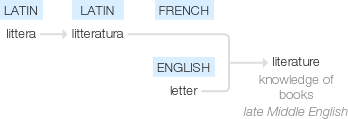Literature
late Middle English (in the sense ‘knowledge of books’): via French from Latin litteratura, from littera (see letter).
wiktionary
From Middle English literature, from Old French littérature, from Latin literatura or litteratura, from littera(“letter”), from Etruscan, from Ancient Greek διφθέρᾱ(diphthérā, “tablet”). Displaced native Old English bōccræft.
etymonline
literature (n.)
early 15c., "book-learning," from Latin literatura/litteratura "learning, a writing, grammar," originally "writing formed with letters," from litera/littera "alphabetic letter" also "an epistle, writing, document; literature, great books; science, learning" (see letter (n.1)). In English originally "book learning" (in which sense it replaced Old English boccræft); the meaning "activity of a writer, the profession of a literary writer" is first attested 1779 in Johnson's "Lives of the English Poets;" that of "literary productions as a whole, body of writings from a period or people" is first recorded 1812.
Great literature is simply language charged with meaning to the utmost possible degree. [Ezra Pound, "ABC of Reading"]
Meaning "the whole of the writing on a particular subject" is by 1860; sense of "printed matter generally" is from 1895. The Latin word also is the source of Spanish literatura, Italian letteratura, German Literatur.
